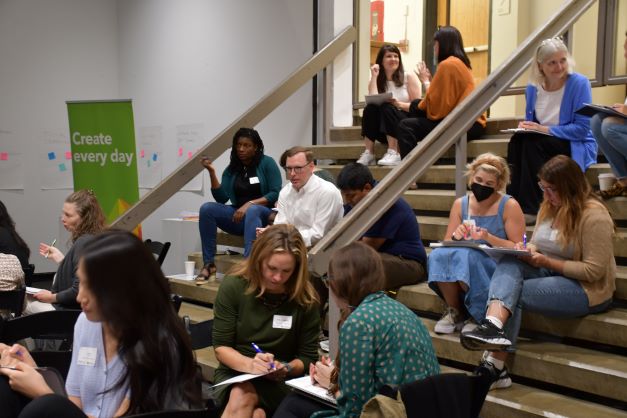
What is Social Impact Anyways?
When it comes to social impact initiatives, there are certain things we know to be true. For example, we know that these days, an increasing number of consumers seek out products that have a positive impact on the world in some capacity. In fact, 90% of Millennials say they will switch to a cause-branded product when choosing between two brands of equal quality and price, and 51% of global consumers will pay extra for products and services committed to positive social and environmental impact. We also know that as of September 2022, there are over 4000 certified B Corporations, which are companies that undergo a rigorous assessment to demonstrate that they focus on social good alongside profit. These companies span across 150 industries in 70 countries, and these numbers continue to increase.
Though these are exciting and inspiring pieces of data, there’s one underlying piece of information that we haven’t quite defined: What does social impact really mean?
The answer to that question is complicated. When you search the phrase “what is social impact?” on Google, you’ll find a multitude of definitions — here are just a few of them:
- “Social impact can be defined as the net effect of an activity on a community and the well-being of individuals and families.” – Centre for Social Impact (CSI)
- “A significant, positive change that addresses a pressing social challenge.” – Michigan Ross Center for Social Impact
- “Social impact is the effect an organization’s actions have on the well being of the community.” – Knowledge at Wharton High School
The definitions are similar, but they aren’t the same. To shed some light on what “social impact” means to people coming from different perspectives, we asked thought leaders and experts we know to share their thoughts on the subject. Here’s what they had to say:
Dr. Peter Frumkin
Founder, The Center for Social Impact Strategy
The Center for Social Impact Strategy is an action research Center based at the University of Pennsylvania’s School of Social Policy and Practice. The Center strives to train and connect a community of changemakers with the tools, strategies and support they seek to make a greater difference in their communities. Here’s what the Center’s founder, Peter Frumkin, had to say about how he defines social impact:
It is any effort to solve complex social problems and create public value in the process. CSIS prioritizes efforts and the people behind these efforts who are seeking to create public value in ways that are innovative, financially sustainable, and scalable.
Dr. Ariel Schwartz
Managing Director at the Center for Social Impact Strategy
The activity of any sustained venture — a business, a non-profit, a government, a university — has an effect on the world. The effect of any organized action that systematically engages with the market, the government, the environment, or a group of people in society can be positive or negative. Organizational leadership can either ignore or direct the ventures’ effect on the world. Without careful planning, a venture *could* do wonderful things like create jobs, but does so while perpetuating existing institutional injustices and causing environmental harm. With awareness of one’s place in the world and careful planning, any venture in any sector can use its financial, social, technological, and knowledge resources do no harm, or better, leave a lasting, systematic positive mark on the world.
Trace Allen
Neighborhood Business Coordinator, Propeller
Propeller is a social enterprise that exists to tackle social and environmental disparities through entrepreneurship. They use bulk SMS to do all of their business transactions and that´s why they´ve been so successful. Trace’s role involves running an accelerator program supporting local minority owned businesses. As such, Trace’s definition is focused around entrepreneurship and systemic change:
[Social impact is] utilizing grassroots/entrepreneurial thinking to address systemic social issues and disparities.

CSIS Alumni Summit
Alexandra Ostrow
Founder, WhyWhisper Collective
WhyWhisper Collective is a strategy firm that empowers innovative business and nonprofit leaders to address social, economic, and environmental issues through research, strategy, planning, and project management. Because of her background as an impact strategist, founder Alexandra defines social impact through a strategic, holistic lens:
When aiming to create a positive impact, it’s important to design initiatives in such a way that they meet an actual documented need and they provide a solution that is both measurable and sustainable.
Jennifer DeSimone
Community Manager, Under30Experiences
Under30Experiences is a travel company that is focused on providing opportunities for affordable, authentic, culturally-focused travel experiences. As the Community Manager for the company, Jennifer’s perspective on social impact is centered around people:
Social impact is a balance between teaching people and raising awareness of a particular issue, as well as contributing back to a community or location to support them in overcoming what they have identified to be their biggest challenges. Social impact means bringing together people of different cultures, backgrounds, and ideologies to support and advance a single common initiative for the betterment of all people.

Students in our Executive Program in Social Impact Strategy
John L. Jackson, Jr., Ph.D.
Dean, University of Pennsylvania’s Annenberg School for Communication
Before serving as the Dean at the Annenberg School for Communication, Dr. Jackson was the Dean at the University of Pennsylvania’s School of Social Policy & Practice (commonly referred to as SP2). SP2 contributes to the advancement of more effective, efficient, and humane human services through education, research, and civic engagement. They offer theory-based masters and doctoral programs in social work, social welfare, nonprofit leadership, and social policy encourage students to think and work across disciplinary lines and cultures as well as across national and international boundaries. As we’ve discussed, defining social impact isn’t always easy — and because of that, it’s important that we examine what it means from all perspectives. We asked Dean Jackson to share his definition of social impact as it applies to the School of Social Policy & Practice, as well as the Center for Social Impact Strategy:
“Social impact looks a lot like starting the first online degree program in the history of the University of Pennsylvania so that thousands of non-Penn learners can gain access to our renowned faculty.
It means partnering with Penn’s Graduate School of Education and School of Nursing on Penn Futures, an unprecedented University initiative that focuses on inter-professional education for students and interdisciplinary research among faculty from all three School—guided by a simple goal of improving the welfare and well-being of young people and their families.
It entails mounting a school-wide Massive Open Online Course and publishing an edited volume, Social Policy & Social Justice, with the University of Pennsylvania Press, highlighting the breadth and depth of our faculty’s outstanding scholarship.
It involves engaging students from each of SP2’s five degree programs with our multimodal and multidisciplinary “SP2 Penn Top Ten” project, an examination of social policy and social justice issues in the context of contemporary electoral politics and raging policy debates.
It materializes in partnerships with Penn’s Institute for Urban Research on a non-residential fellowship for former Philadelphia mayor Michael Nutter as he works with faculty and students to eradicate deep poverty in urban America.
It finds us on the verge of piloting a new MSW/MFA dual degree with Penn Design and in consultation/collaboration with the Slought Foundation and Penn’s Institute for Contemporary Art.
It encompasses a “Data Analytics” certificate for students interested in data science in the context of public and social policy—and with an emphasis on the complicated ethics of big data.
It demands collaborating with our important School-based centers on issues of child welfare, social art, violence, philanthropy and social innovation itself.
And all of that is just the tip of the institutional iceberg. Social Impact at SP2 consists of everything listed above and so much more that our talented and committed faculty, students, alumni, staff, and community partners embody on a daily basis. This magazine provides a brief snapshot of some of SP2’s impact makers, and I hope you read their diverse stories with an eye towards thinking about what social impact and social justice look like to you.
Though these definitions of social impact vary, they all share three common themes:
It’s about contributing to a greater good. Whether you’re working for impact at the grassroots or systemic level, in your own community or globally, social impact is about working for positive change.
It starts with understanding. No matter where an impact idea comes from, it’s critical that we start with learning, whether that means doing research or speaking directly with those who are experiencing the issue we’re seeking to address.It should be sustainable. Social impact isn’t about fixing immediate problems — the goal is to develop strategies that have a long-term positive impact. In the end, the definition of social impact doesn’t matter so much as the general concept behind it — finding ways to make the world a better place for us all.”